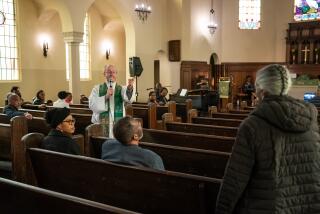Guided by Faith : Mennonite Church Is Spiritual Home for Taiwanese Immigrant Christians
- Share via
BUENA PARK — When Taiwanese immigrant Ke-Chhi Tsai moved to the United States 24 years ago, the one thing she nearly had to leave behind was her faith.
A devoted Christian for 60 years, Tsai could not find a congregation where members spoke her native dialect--until about six years ago, when she was spotted at a supermarket by members of the Taiwanese Mennonite Church of Buena Park.
Tsai gladly became one of the oldest regulars at the close-knit spiritual home for Taiwanese-speaking Mennonites--the only congregation of its kind in the Southwest, according to church officials.
The congregation on Valley View Boulevard was started about 12 years ago in the Cerritos living room of the Rev. Mark Chen with only a handful of friends. Since then, the group has grown to more than 50 members, composed mostly of Taiwanese immigrants from around the world, including Southeast Asia and South America.
Although they gather every Sunday to hear the passionate teachings of a Mennonite minister, most worshipers acknowledge they know very little about this unique Protestant denomination. What binds them together is the need for a familiar cultural setting to practice Christianity and to adjust to American life.
“Some of them are not believers at first,” said Susan Chen, the wife of the minister. She assists her husband on weekly home visits to elderly members of the congregation such as Tsai. “After coming (to the United States), a lot of people are lonely. They are just sitting at home. Their children have no time to take them out. After going to church, they see a lot of support and friendship.”
The small Mennonite Church kept growing in the local Taiwanese community through word of mouth. A new English-language Sunday service and Saturday English Bible study class have been added to accommodate the younger generation.
Internist Dr. Norman Kuo of Cypress has been going to the church for five years with his wife and two children. He often introduces his patients to the Mennonite community to help them deal with the stress and pain immigrants can feel.
Kuo said two of his patients suffered serious depression and were described as “psychotic” by friends. They found no need to seek psychological treatment after they found help through the church.
One was a man who was upset because he feared losing his business; he did not realize he could not operate it in a residential area and was battling local officials. The other was a homemaker who was distressed because she did not speak English and had no social life.
The man improved after the church helped him find separate quarters for his business and residence. The woman adjusted to her life after the pastor’s family opened their home to her.
“Because of the emotional and spiritual support from the church, (they) recovered without going through the trauma of a psychiatric hospital,” Kuo said.
Members say the family-like support system has made the name of the denomination almost a non-issue. Even the founding pastor, Mark Chen, and the current head preacher, Caleb Tsai, are latecomers to the Mennonite Church. Both were trained in the same Christian seminary in Taiwan, which did not teach them any specific branch of Christianity.
“In many ways the distinctions in North America were not as important to the Taiwanese,” said Hugh Sprunger, a Pennsylvania-based missionary who worked in Taiwan in the 1950s. “They embraced the Christian faith without knowing this (denomination) was quite different from something else. Their first attraction was not just to the Mennonites but to a Christian lifestyle.”
There are more than 120,000 Mennonites in the United States, most concentrated in the Northeast, where they originally settled in the 18th Century, according to the Pacific Southwest Mennonite Conference.
About 2,000 members reside in California. The ethnically diverse congregations have about 20 outposts in Southern California and several in Orange County, said Alyssa S. Kerns, a spokeswoman with the conference.
The Mennonites are Protestants who traditionally emphasize a simple lifestyle and value nonviolence. They practice adult baptism and believe in the separation of church and state, which also forbids them from going to war. The Amish are an offshoot of the Mennonites, breaking away from the Mennonite Church more than 300 years ago because they felt it was too worldly and too dependent on emerging technology.
The degree of lifestyle conservatism among today’s Mennonites varies widely, according to Jeff Wright, coordinator for the Pacific Southwest Mennonite Conference.
“We have Mennonites in the East Coast who are very much like the Amish in lifestyle and dress,” said Wright, adding that some men wear plain coats and some women don bonnets and long dresses. “They are called the ‘conservative Mennonites.’ By the time Mennonites got out to the West Coast in the 1890s, we looked pretty much like everyone else. But there is a still a whole range of gradations, from looking identical to the Amish to looking like the neighbor next door.”
Europeans from many denominations started spreading the Gospel in China about 120 years ago when the society was rooted in the worship of ancestors and multiple deities, according to Susan Chen, who was educated in Christian schools in Taiwan. The Mennonites made their first mark in Taiwan by providing medical services to the poor in the 1950s after they were kicked out of Communist China, Mark Chen said.
In the United States, the enthusiastic immigrant churchgoers use the words Mennonite and Christian interchangeably. They recite Scripture with closed eyes and sing old Christian hymns in Taiwanese. To them God is God, whatever the denomination.
Joseph Tsai, Caleb Tsai’s son, who leads the musical segments of the services, put it bluntly. “It doesn’t matter. We all worship the same God. It’s like shopping at Ralphs or Vons. It’s all the same supermarket.”
More to Read
Sign up for Essential California
The most important California stories and recommendations in your inbox every morning.
You may occasionally receive promotional content from the Los Angeles Times.













